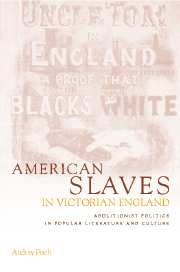Book contents
- Frontmatter
- Contents
- Acknowledgments
- Introduction:Communicating “a correct knowledge of American Slavery”: J. B. Estlin and the “breeder” in Frederick Douglass's Narrative
- 1 “Exhibiting Uncle Tom in some shape or other”: the commercialization and reception of Uncle Tom's Cabin in England
- 2 Abolition as a “step to reform in our kingdom”: Chartism, “white slaves,” and a new “Uncle Tom” in England
- 3 “Repetitious accounts so piteous and so harrowing”: the ideological work of American slave narratives in England
- 4 “Negrophilism” and nationalism: the spectacle of the African-American abolitionist
- Epilogue:“How cautious and calculating”: English audiences and the impostor, Reuben Nixon
- Notes
- Bibliography
- Index
4 - “Negrophilism” and nationalism: the spectacle of the African-American abolitionist
Published online by Cambridge University Press: 20 February 2010
- Frontmatter
- Contents
- Acknowledgments
- Introduction:Communicating “a correct knowledge of American Slavery”: J. B. Estlin and the “breeder” in Frederick Douglass's Narrative
- 1 “Exhibiting Uncle Tom in some shape or other”: the commercialization and reception of Uncle Tom's Cabin in England
- 2 Abolition as a “step to reform in our kingdom”: Chartism, “white slaves,” and a new “Uncle Tom” in England
- 3 “Repetitious accounts so piteous and so harrowing”: the ideological work of American slave narratives in England
- 4 “Negrophilism” and nationalism: the spectacle of the African-American abolitionist
- Epilogue:“How cautious and calculating”: English audiences and the impostor, Reuben Nixon
- Notes
- Bibliography
- Index
Summary
The mother country, of late years, has signalized itself particularly in the great delight it has taken to avail itself of every opportunity to foster, and feed, and flatter, runaway American negroes. It has long been a standing joke, among the witty and satirical writers of England, their own countrymen's fondness for lions and lionizing, – a taste that has formed the theme of much deserved ridicule, and that has furnished a point to no litde humour. Persians, with longbeards, – Turks, with long pipes – Chinese, with long tails, and North American Indians, with not very long blankets, are constantly succeeding one another in the salons, or at the tables of the haut ton, – one monster lion yielding place to the other, and, in time, receiving the delicate attentions of the fair, the services of the powerful, and the admiration of all.
But throughout all this Britonnia [sic] is a little fickle in her fashions, and, having run from the delicate Chinese olive, down through the dark-hued Asiatic, and Turkish, and Moorish, and copper coloured Indian, she has lately discovered, in the indulgence of her singular taste, that in this matter of complexion, – “in this deepest deep, a deeper still” of hue. Nothing goes down, now, with her, so well as the genuine black. (“English Negrophilism”)
It might seem surprising to begin a discussion of the presence of African-American abolitionists in England with such an exaggerated and ungenerous parody of that presence.
- Type
- Chapter
- Information
- American Slaves in Victorian EnglandAbolitionist Politics in Popular Literature and Culture, pp. 69 - 90Publisher: Cambridge University PressPrint publication year: 2000



